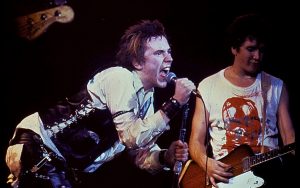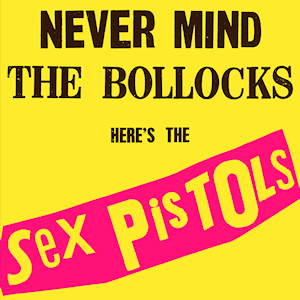From the ashes of phoney rock music rose a new genre, full of anger and centred around loud vocals followed with an aggressive criticism of the government preaching beliefs of anti- conformism and anti-authoritarian doctrines. This new movement which is accurately named “Punk”, was lead in the 1970s by the explosive band Sex Pistols and it’s anarchistic lead singer Johnny “Rotten” Lydon with their booming and heavily censored success “Never Mind the Bollocks, Here’s the Sex Pistols” which catapulted them headfirst in the world’s spotlights and a sea of controversy.
The band at the time of the album’s recording, was composed of four men: the singer John Lydon, nicknamed “Johnny Rotten”, the bassist and vocalist John Simon Ritchie, known better as Sid Vicious, quickly becoming the icon of the band after he replaces the ex bassist Glen Mantlock who had recently fallen out of grace; Stephen Philip Jones, known as Steve Jones by the public, the guitarist and also bassist on most of Never mind The Bollocks due to Vicious’ musical incompetence and at last Paul Thomas Cook called “Cookie” by his fellow band members.

The album was no longer than 40 minutes and with its 11 songs it perfectly encapsulated the whole punk movement: frustration aimed at anyone within gobbin distance, in particular to their home country of Britain and its government, causing chaos and what Rotten wanted the most, anarchy. The album is divided in two sides: the first is composed of the songs “Holidays in the Sun”, “Liar”, “No Feelings”, “God Save The Queen”, “Problems”; the second is instead made up of “Seventeen”, “Anarchy in the U.K.”, “Bodies”, “Pretty Vacant”, “New York”, “E.M.I”.
The opening to the album “Holidays in the Sun” was inspired by a holiday in Jersey isle which resulted them into being thrown out due to their controversial figure. The trip was later followed by a couple weeks in Berlin, which, although being described as depressing and rainy, was loved by the lead singer for its insanity of the place and the oppression caused by the wall, viewed by him as a “summer prison camp” much like he viewed London, as a prison camp he was trapped in with the constant threat of violence and hatred being the only ever present feeling in the citizens.
“God Save The Queen”, originally named “No Future”, was one of the most controversial tracks of the entire album, leading it being heavily censored to the point that the BBC refused to play it. The reason for the backlash was due to the aggressive lyrics which attacked Britain’s ruler, Queen Elizabeth II and the country’s monarchy, comparing the Queen’s reign to a “fascist regime”, claiming she’s just a puppet for the aforementioned Fascist Regime “She ain’t no human being” and stating that “there is no future and England’s dreaming”. This line is the followed the motto of any true punk band is self worth and challenging authority “Don’t be told what you want to want to; And don’t be told what you want to need”. A terrific message in all respects one should never blindly trust anyone, so why in turn do we blindly assume the government is on our side. He then continues by warning the government all the crimes they have committed will come back to haunt them: “Oh, Lord, God have mercy; All crimes are paid“ followed by “When there’s no future how can there be sin?“ summing up the main sentiments of an anarchist: There’s no future for us anyway, so forget morals.But the song’s goal was’t to shock everyone, but to instead invoke sympathy for the working class and the general dissent towards the monarchy as the singer explained in an interview saying: “You don’t write ‘God Save the Queen’ because you hate the English race. You write a song like that because you love them, and you’re fed up with them being mistreated.”
“Anarchy in the U.K.” endorses a extraordinary sensational and brutal concept of anarchy that encapsulated senses of embittered rage, confusion, restlessness, economic frustration and social alienation felt by a young generation deprived of their rights during the declining economic situation and bland music scene of the mid 70s. Malcolm McLaren viewed the song “a call to arms to the kids who believe that rock and roll was taken away from them. It’s a statement of self rule, of ultimate independence”. In the opening lyrics Rotten find the best way to anger the establishment in just two lines, by first claiming to be the antichrist and then following up with calling himself an anarchist. He then describes how he wants to “destroy the passersby”, later clarifying that he was just referring to the complacent people that don’t contribute and that just sit by and complain and don’t actually do anything to better themselves or the situation for others. The non-participating moral majority. In the first chorus of the song with the line “no dogsbody!”
the singer describes his dissent with being obedient to the government. In the fourth verse through the line “I thought it was the U.K.” he explains how the U.K. isn’t united due to things such as the I.R.A. (Irish Republican Army) previously mentioned in the verse. The revolutionary song ends with a true anarchist’s battle cry “I get pissed, destroy!” as the instrument slowly fade out into an unsettling silence as if a storm just passed by.
At last we have “E.M.I.” the Pistols’ diss track directed towards a record label by the same name after the band’s contract with it ended. In this song they mock the label for wanting to cash in on the growing punk phenomenon and sign the band, only to drop them when the group’s antics damaged its reputation.
Sex Pistols with their debut album revolutionised the world of music and achieved stardom, leading to their introduction in the Rock and Roll Hall of Fame thanks to their unique style and aggressive lyrics.
Davide Guida 2Q Classico Cambridge 2.0 – Liceo Vico Napoli
